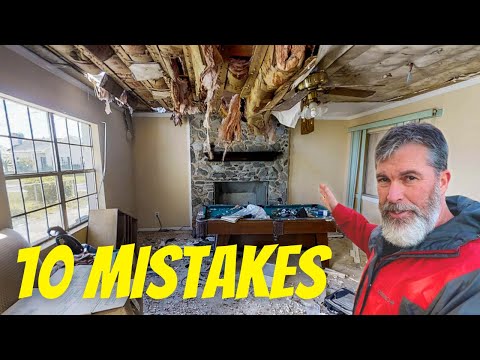
If you are new to real estate or a novice investor we’re sure you will agree that Wayne Turner shares valuable information that anyone can use to succeed.
In this episode (Video) Wayne shares the 10 mistakes that he and his clients have made over the years when buying foreclosures and most importantly how to avoid making the same mistakes.
For nearly 30 years Wayne has experienced just about everything when it comes to real estate and he’s an open book when it comes to sharing his experiences.
Keep Connected with us…
Home Page:
Facebook:
Instagram:
LinkedIn:
Twitter:
Pinterest:
TikTok: @therealwayneturner
*DISCLAIMER* The contents of this video are for strictly educational and entertainment purposes. This video is not intended to provide financial, accounting, tax, or legal advice. For financial or legal advice consult with financial advisor or lawyer. I may earn commission from purchases made through links in this post.


Top 10 Mistakes to Avoid When Buying a Foreclosure:
1. Don’t Buy Sight Unseen
Always inspect the property in person or have someone do it for you. Photos and descriptions can be misleading.
2. Understand “As-Is, Where-Is”
Even if a property is sold “as-is,” you still have a due diligence period (typically 10–14 days) to inspect and back out without losing your deposit.
3. Know the Cost of Repairs
Visit hardware stores to estimate material costs and get quotes from contractors. Labor can cost as much as materials. Offer to pay contractors for their time to get accurate bids—it builds goodwill.
4. Get a Title Policy
This protects you from liens, back taxes, or claims on the property. It’s a one-time cost and essential for peace of mind.
5. Secure Your Funding Early
Have financing ready—banks won’t wait. Local banks and credit unions are often more flexible. Expect to need: 20% down, 3% closing costs, Funds for repairs
6. Understand Loan Limitations
FHA and conventional loans may not be available for homes in poor condition. You might need alternative financing if the property has issues like mold, termites, or vandalized plumbing.
7. Know the After-Repair Value (ARV)
Use comps or hire an appraiser to estimate the value post-renovation. Ask for worst-case scenarios to avoid overestimating.
8. Don’t Get Emotionally Attached
Especially at auctions, stick to your budget. Overbidding due to competition can lead to financial regret.
9. Budget for Overruns
Add 20% to your renovation budget to cover unexpected issues like hidden termite damage or plumbing problems.
10. Check Flood Zones
Flood insurance can be costly and mandatory in high-risk zones. It affects future buyers and resale value. Know the zone and insurance cost before buying.
Final Advice
Don’t aim for a huge profit on your first flip. Even breaking even provides valuable experience. If you live in the home for 2+ years, you may qualify for capital gains tax exemptions (up to $250K for singles, $500K for couples).
Great video! My husband and I used to buy foreclosures. Got one, found out it had a couple inches of water in the basement and all HVAC ripped out, oh joy. But that was 20 years ago and we still are renting it out. All around that house is being developed. We never flipped, just held, still are.
Wayne, I wish I could speak with you personally about a tax sale purchase I made 15 years ago. It has 5 graves on it and is landlocked but about 2 miles from a huge car battery plant just built, near a major intersection. I’ve gotten offers from ppl just looking up information and sending out letters but have never really replied. I’m just ‘sitting’ on it…
Hopeful it will only increase in value and somehow the graves and no access will somehow fix themselves, lol. Sorta in a pickle. Thankfully, the taxes are nominal.
there’s a home around the corner that was bought in 2014. According to the Zillow photos, it looked great inside. The home was vacated by 2019. The house was not sealed, meaning I looked inside & the ceiling & wall drywall were all damaged beyond repair. The roof had already caved in. That would’ve meant the electrical was all beyond repair.
Nobody wants to do a rebuild on that property. But the township came in & demolished what was left of it just for safety sake.
You said thank you if we’re still here.. No thank you for the advice! It’s very helpful.